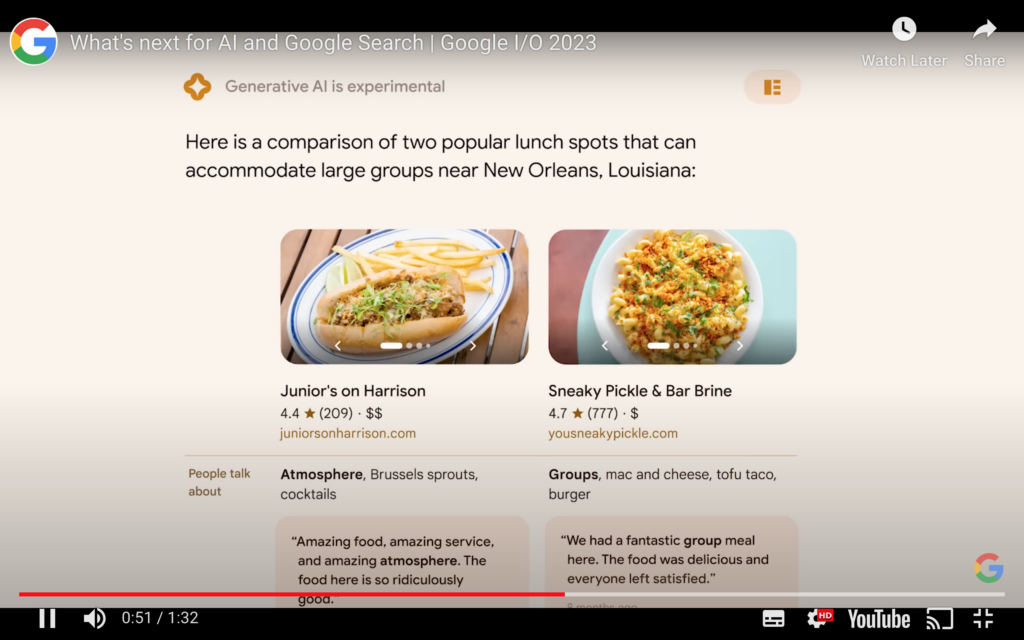What is Google’s SGE?
In today’s landscape, where search engines act as the gateways to the world’s information, Google’s Search Generative Experience (SGE) is a transformative force. This innovative platform uses generative artificial intelligence (AI) to redefine how we find and interact with information online. By working across myriad sources, SGE delivers quick, comprehensive answers directly within search results, eliminating the need to scroll through endless individual web pages. However, this leap forward doesn’t come without its challenges, which range from potential accuracy concerns to implications for search engine optimisation (SEO). As we explore SGE’s capabilities, compare it with rivals like ChatGPT and Bing’s AI, and assess its impact on SEO, we also uncover strategies for optimising content in this new AI-driven search landscape – crucial for ensuring that information remains accessible, reliable, and valuable in the age of generative AI.
https://blog.google/products/search/generative-ai-search/
In the PDF “Google, about SGE”, Srinivasan Venkatachary and collaborators highlight Google’s evolution in integrating generative AI into Search, marking a significant shift in the way information is accessed and interacted with online.
From early implementations like spelling correction systems to the introduction of more advanced models like BERT and MUM, Google has worked hard to enhance Search’s quality and relevance continually. The recent Search Generative Experience (SGE) represents the next frontier, promising to revolutionise information engagement by understanding and organising content in new ways. This initiative, part of Search Labs and now available in over 120 countries and multiple languages, invites users to explore its potential.
What is generative AI in Search (SGE)?
SGE introduces a new phase in how we use AI to improve Google Search, making it more intuitive. This upgrade allows users to interact with Google Search in more advanced ways, improving how information is found and utilised:
- Users can now ask more detailed and nuanced questions, enabling a deeper exploration of topics.
- It simplifies complex subjects by quickly summarising key points, with additional links for in-depth exploration.
- SGE facilitates immediate actions, such as drafting documents or creating images directly from the search interface.
- The process of discovering information becomes more conversational, allowing users to follow up with additional questions or explore suggested next steps seamlessly.

Google SGE relies on advanced large language models (LLMs), such as the Pathways Language Model 2 (PaLM 2). These models are crucial in enabling SGE to produce rich, content-filled responses to user questions. Through the integration of generative AI technologies, including natural language processing and machine learning, SGE can understand, process, and generate responses to search queries in a nuanced way.
The introduction of Google’s SGE offers several significant benefits to users. By providing simple, easily understandable overviews of complex topics, SGE makes it easier for them to grasp essential information quickly. The conversational and interactive nature of the search results enriches the user experience, allowing for a more engaging and intuitive search process.
How does SGE affect SEO?
SGE introduces a new approach to search that could significantly impact SEO strategies. By prioritising direct answers and summaries within search results, websites might experience reductions in organic traffic patterns, as users could find answers directly in search, without having to click through to external sites. This shift suggests an adaptation in SEO practices is needed, with a greater focus on optimising content to align with the types of queries that SGE is likely to feature most prominently, as well as using structured data and natural language to improve visibility and relevance.
To improve visibility in SGE search results, focus on these SEO factors:
- Optimise for featured snippets: Structure content to directly answer questions, using concise, authoritative explanations.
- Leverage structured data: Use schema markup to help Google understand the context and content of your pages better.
- Focus on quality and relevance: Make sure content is detailed, up-to-date, and closely aligned with user intent.
- Use long-tail keywords: Incorporate detailed, conversational queries into your content strategy to match more complex search goals.
- Improve E-E-A-T (Experience, Expertise, Authoritativeness, Trustworthiness): Highlight credentials, secure trusted backlinks, and maintain a strong, positive online presence.
Challenges and Considerations
SGE faces challenges like misinterpretation, which can change the intended meaning of the information, and “hallucination,” where it might present inaccurate facts. It also deals with biases in its training data, which can lead to narrow or negative portrayals. Despite efforts to minimise these issues, challenges remain, such as:
- The potential for SGE outputs to reflect biases inherent in its training data.
- Instances where SGE might generate content with a perceived opinion.
- Contradictions or duplications within search results due to SGE’s integration with existing Search features.
The introduction of SGE could lead to less organic traffic for websites as users find answers directly in search results. To adapt, businesses and content creators should focus on creating high-quality content that aligns with user intent and optimising for generative AI. This includes using natural language and implementing structured data to help AI understand and categorise content more effectively, thereby enhancing visibility in this new search landscape.
As the search landscape is transformed by AI, including Google’s SGE, it’s crucial to keep your SEO strategies up to date. For expert guidance on optimising your content for this new era of search, connect with technology-driven content creation agencies like Key Content.



